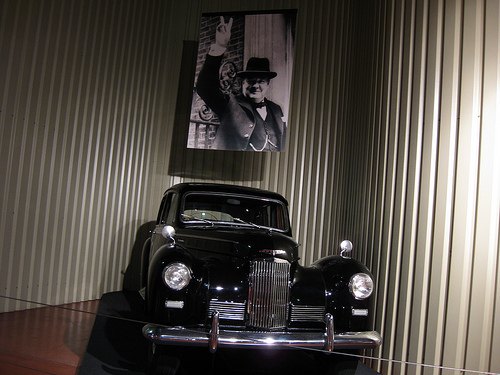Quote of the Day: "It's Just Really Good to Be Back in the Car Business"
Daniel Howes’ column for the Detroit News is based on an interview with GM CEO Fritz Henderson, while the latter was embarked on a national dealer handholding tour [your name suggestions below]. And here’s the first money shot: “It’s just really good to be back in the car business.” Howes reads TTAC; I’ve taken him to task many times for his transformation from kick-ass European correspondent to Motown pom-pom waver and, at best, chronic fence sitter. “Now, before all the cynics glom on to that single sentence as proof — proof, I tell you — that GM’s leadership is back to the bad ol’ days of denial, I’d offer this: There is more that’s changing inside GM today than staying the same, starting with the fact that the CEO and key leaders of his management team spend a whole lot more time talking about cars and trucks than the nonautomotive headache du jour.” This is all kinds of wrong.
Why would Howes think that Henderson’s statement indicates traditional Detroit denial? It has nothing to do with denial, which is, as we know, Maximum Bob Lutz’s bailiwick. In fact, the jefe’s comment raises entirely different, equally important questions.
Given that Henderson is a GM lifer—former GM CEO Rick Wagoner’s clone and hand-picked successor—what the hell was Henderson doing until now? What business was he in, exactly?
Unless he’s talking about Henderson’s love life or golf game, Howes’ “nonautomotive headache du jour” remark assumes there’s a separation between the business of GM (securing a mega-suckle on the taxpayer teat, protecting executives from defenestration and salary cuts, fucking around with Opel, etc.) and cars and trucks (building cars and trucks, selling them). To paraphrase the B52’s, “WELL THERE ISN’T!”
I get that Howes thinks GM is more product-oriented these days. But the chaos that is GM’s branding strategy, on-again-off-again model development and mislaid marketing plans (now where did I put that truck month?) continues apace. As they say, talk is cheap. Unless it costs $100 billion dollars of my tax money. Anyway . . .
I reckon Howes got the Hendersonian subtext right. The word “just” indicates that the CEO is losing his stomach for politics. You can almost here the sigh in his voice. Which is not a good thing considering Henderson works for the United States government [see: above].
Ironically enough, Danny provides us proof of Henderson’s ongoing inability to face market reality elsewhere in his opus.
“A consistent theme is, ‘Let’s go on the offense,’ ” [Henderson] said. [The dealers] like that GM has worked its inventories down to historic levels; that the next products hitting showrooms are competitive (or better) than the best in their segments; that the beginnings of a marketing campaign (designed in some 30 days, unheard of for GM) is featuring the products and standing up for its attributes.
Quick: which GM products—current or forthcoming—are better than their competition? (Maybe that’s why Howes mixed-up his pronouns.) And is it me or does this sound like the same old punch-the-fist-in-the-air-like-you-just-don’t-care GM?
I’m not suggesting the nationalized automaker should play defense, because that would make too much sense, obviously. When your market share is disappearing, you attack! Right? Screw defending what you already have. Faster, Pussycat! Sell! Sell! Sell!
Hey an all-attack all-the-time strategy worked for Winston Churchill. Oh wait, the wartime PM secured Britain’s defenses first. And he had a little help in the attacking department from the Russians and the Americans. Anyway, it seems that Howes loves Winnie, even if he hasn’t studied the Anglo-American’s military leadership.
Churchill: “Now this is not the end. It is not even the beginning of the end. But it is, perhaps, the end of the beginning.”
Howes: “It’s a start that is far from the end. The next few months are all about GM solidifying its bottom in the United States and rebuilding relationships with employees, dealers, suppliers, customers, a skeptical financial community and even the government, whose take on GM’s chances for success is the short side of a slam dunk.”
Farago: “GM is a zombie. A dead automaker walking. Chapter 7 is only a bailout or two away. Deal with it.”
More by Robert Farago
Latest Car Reviews
Read moreLatest Product Reviews
Read moreRecent Comments
- ToolGuy 9 miles a day for 20 years. You didn't drive it, why should I? 😉
- Brian Uchida Laguna Seca, corkscrew, (drying track off in rental car prior to Superbike test session), at speed - turn 9 big Willow Springs racing a motorcycle,- at greater speed (but riding shotgun) - The Carrousel at Sears Point in a 1981 PA9 Osella 2 litre FIA racer with Eddie Lawson at the wheel! (apologies for not being brief!)
- Mister It wasn't helped any by the horrible fuel economy for what it was... something like 22mpg city, iirc.
- Lorenzo I shop for all-season tires that have good wet and dry pavement grip and use them year-round. Nothing works on black ice, and I stopped driving in snow long ago - I'll wait until the streets and highways are plowed, when all-seasons are good enough. After all, I don't live in Canada or deep in the snow zone.
- FormerFF I’m in Atlanta. The summers go on in April and come off in October. I have a Cayman that stays on summer tires year round and gets driven on winter days when the temperature gets above 45 F and it’s dry, which is usually at least once a week.


































Comments
Join the conversation